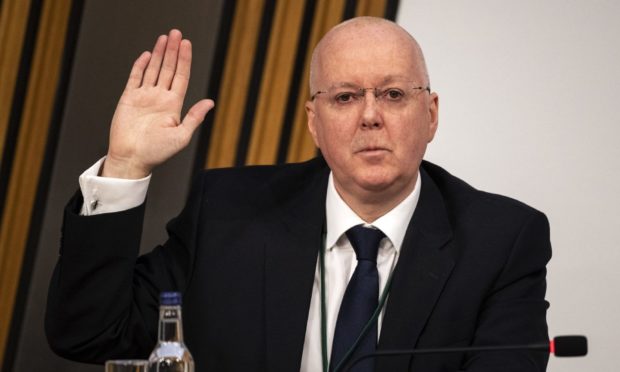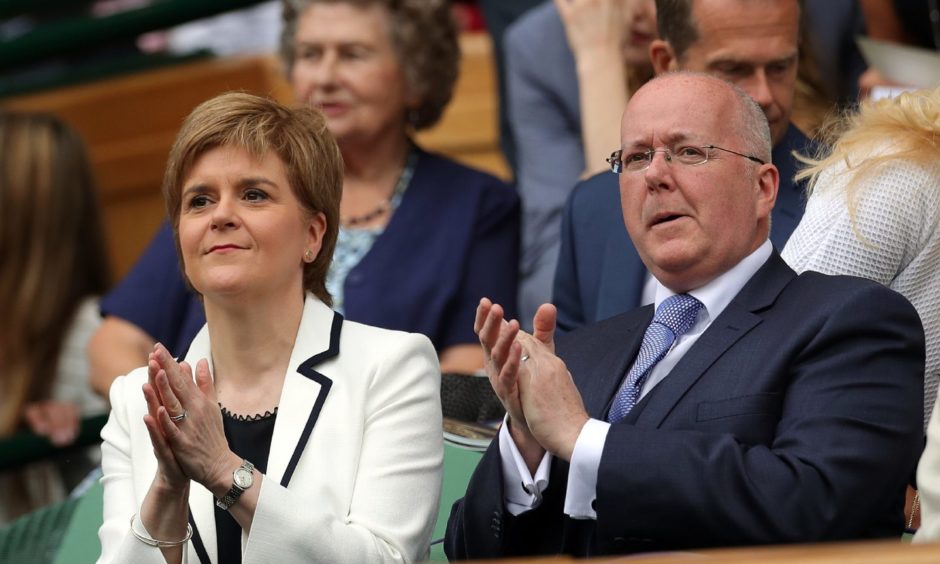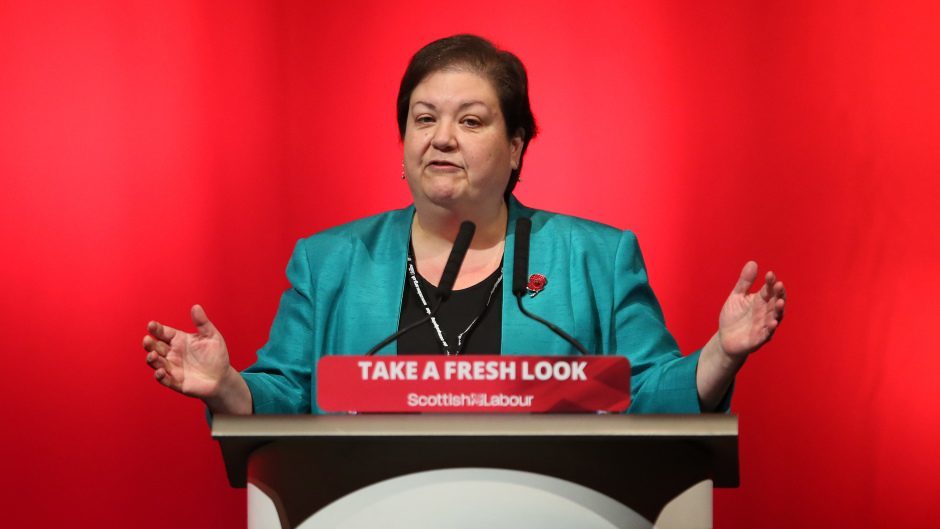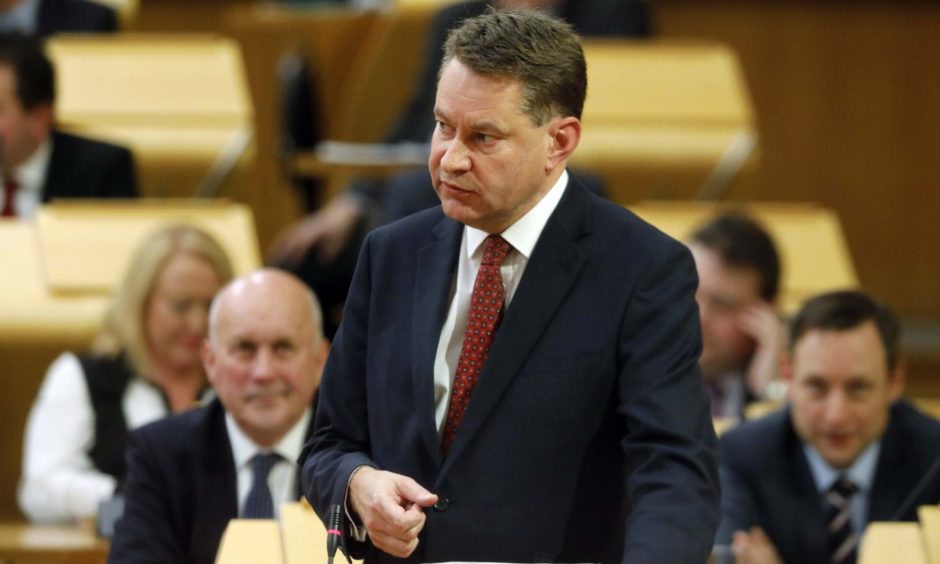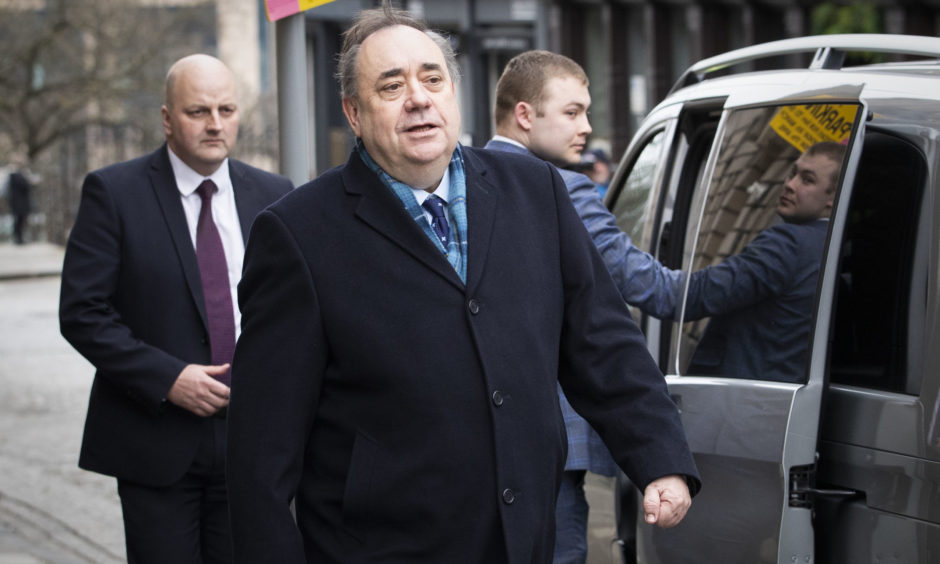Testimony from Nicola Sturgeon’s husband has fuelled claims that the first minister misled parliament and broke the ministerial code.
Evidence from SNP chief executive Peter Murrell was seized upon by opposition MSPs on the Holyrood committee investigating the botched government probe into complaints against former first minister Alex Salmond.
Mr Murrell, who has been married to Ms Sturgeon since 2010, was quizzed about two meetings held in 2018 between his wife and Mr Salmond in the couple’s home.
His claim that “the issue raised at the time was a Scottish Government matter”, and therefore he did not need to know the reason for the meetings, was said to have “directly contradicted” written evidence Ms Sturgeon submitted to the committee.
The first minister has previously said she had agreed to meet her predecessor because she believed he was about to resign from the SNP, and “as party leader, I considered it important that I knew if this was, in fact, the case in order that I could prepare the party to deal with what would have been a significant issue”.
Under the ministerial code, if Ms Sturgeon held the meetings in her capacity as first minister then details of the discussion would have had to be officially recorded.
However, if it was was as SNP leader then it has been suggested Mr Murrell may have been informed of the details of the allegations, as party chief executive.
Jackie Baillie, Scottish Labour deputy leader and committee member, challenged Mr Murrell on the apparent discrepancy in relation to the first meeting on April 2 2018.
“Your evidence conflicted with hers. You said that she had that meeting as the first minister, and therefore you wouldn’t know because it wasn’t proper for you to know government business,” she said.
“I entirely accept that statement. The difficulty you have is, Nicola Sturgeon has said… she wasn’t the first minister having that meeting, she was the SNP leader.
“As the highest-ranking official within the SNP, would you have expected to be told about it?”
Mr Murrell, who revealed he has not spoken to Mr Salmond since the 2017 election, said: “I think, again, it is set out there for you.
“If it was a matter that was coming to the party as something that was about to happen, then, yes, I would be expect to be told.
“That’s what happens. I get told things when they are about to come my way, and that happens all the time.
“Similarly, when the news was breaking, it came to me very late. It’s on a need-to-know basis.”
However, Ms Baillie said: “The reason I’m exploring this is because there is a direct conflict in your statement compared to Nicola Sturgeon’s.
“There’s no dubiety about that, you’ve both written different things.”
Mr Murrell responded: “I just don’t accept that.”
‘First minister’s ever-changing story’
Speaking after the evidence session, Ms Baillie said it now looked like the failed government investigation into Mr Salmond was “driven by a dangerous cocktail of vendetta and incompetence”.
She added: “If Peter Murrell, as chief executive of the SNP, was not aware of the nature of the meeting in his own home, then I am astonished.
“However, more serious would be if the first minister was breaching the ministerial code and discussing details of the government’s investigation to Alex Salmond.”
Conservative committee member Murdo Fraser said: “Peter Murrell’s words indicate that Nicola Sturgeon misled parliament, gave false evidence to the committee, and broke the ministerial code.
“The SNP chief executive said today that the meetings with Alex Salmond were government, not party, business. That is the opposite of what Nicola Sturgeon claims.
“The first minister’s ever-changing story has been dealt a fatal blow by her own chief executive and husband. His evidence has shattered her claims to pieces.”
Leaked messages
During the evidence session, Mr Murrell initially stated he was not at home for either meeting between Mr Salmond and Ms Sturgeon in their home, on April 2 and July 14 2018.
“I wasn’t at home, and I wasn’t aware of the capacity in which she was having the meetings. I wasn’t at home for either meeting,” he said.
However, he later said he did arrive home before the April 2 meeting had concluded, but that he did not discuss the nature of the conversation with his wife afterwards.
Mr Murrell, who has been party chief executive since 2000, said: “When you are married to the first minister, who is privy to lots of information, when she says she can’t talk about something, you don’t continue to say, ‘ah, but…’
“It just doesn’t happen. She has been a minister for a long time, and works very hard every day, and every weekend, and when we get precious time together, the last thing we want to be doing is rerunning days with each other, or whatever.
“So when she says that she can’t talk about something, that is the end of it and we move on to something else.”
MSPs also quizzed the chief executive on leaked text messages that showed that, on the day after Mr Salmond first appeared in court, Mr Murrell said it was a “good time to be pressurising” police and that the “more fronts he (Mr Salmond) is having to firefight on the better for all complainers”.
Asked if he could see why the messages might be viewed by some to be concerning, Mr Murrell said: “I can see that the language that I used was open to misinterpretation. It wasn’t about pressurising the police.
“There was a great deal of upset that day. The previous day, you know, I had been working with Alex for 30 years at that point, and I think we were all shocked by the scale of the charges that were brought against him.
“So there was a great deal of upset the previous day. I know myself I didn’t really sleep that night. I came to the office and everyone was… you can just imagine everyone was quite gutted.”
Mr Salmond was cleared of all charges after a High Court trial this year.
Mr Murrell said he regretted the language he used in the text messages. “Reflecting on these messages now, they seem quite out of character, so to me it suggests just how upset I was at the time,” he said.
The committee was established after Mr Salmond objected to the way the complaints had been handled and took successful civil legal action against the government he used to lead.
A judicial review found the process had been “tainted with apparent bias”, an outcome that led to Mr Salmond being paid more than £500,000 in taxpayers’ cash to meet his legal costs.
